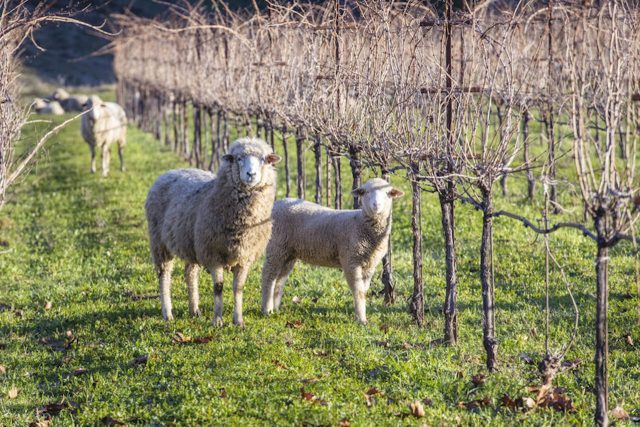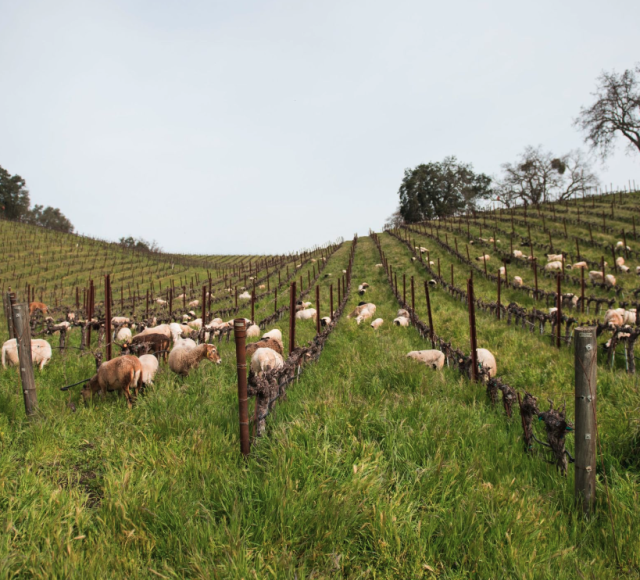‘It’s the Wild West for regenerative viticulture right now’
Without a standardised definition and rules, “it’s the Wild West for regenerative viticulture right now,” according to Jess Baum from Bonterra Organic Estates.

Baum, who is the ‘senior director of regenerative impact’ at the Californian wine producer, is becoming increasingly worried about the potential damage being done to the regenerative cause due to the lack of an agreed set of rules for the practice, while also concerned by the growing number of wine producers using the term without certification.
As a result, in an interview with the drinks business in November, Baum said that the worthy movement – which is fast gaining ground – risked being devalued, while the term ‘regenerative’ could become little more than a buzzword.
She commented, “Due to an absence of a global or government definition for what ‘regenerative’ means, it becomes essentially an adjective that anybody can apply to refer to a bunch of practices, so it becomes a claim that is not validated.”
Continuing, she told db, “We believe in strong, rigorous certifications to uphold claims and verify practices, and being audited.”
She added, “Without a structure or a legal definition, then anybody can use it… it’s the Wild West for regenerative right now.”
Indeed, Baum believes that wine drinkers should be questioning of brands that “claim to be regenerative with no substance behind it”.
Agreeing with Baum, Marybeth Bentwood, who is Bonterra’s senior director for public relations, stressed that it’s necessary to provide proof you are employing regenerative approaches through an audit process, while commenting that certification is not prohibitively pricy.
“Certifying is not that expensive… and I think, when you are a large-scale producer, and you’re distributed globally, and you’re using regenerative as an adjective, but not certified, then I would simply ask, ‘why not certify?’”
As for the type of certification, with a number of providers, who should wine producers turn to? “We’re big believers in Regenerative Organic Certification (ROC) and while we understand that it is a challenging standard to meet, it really is best-in-class,” said Bentwood.
However, is there a danger that seeking certification might put wine brands off taking up regenerative approaches, and therefore slow their progress towards more sustainable production?
Baum responded, “Ultimately certifications are there to protect consumers… it is about verifying what it is, and isn’t, by being very clear.”
Continuing she said, “Certifications provide a very clear yardstick, so there’s actually a standard, and verification, even if the consumer doesn’t understand the nuances, is a protective mechanism guarding the claims.”
Concluding on this topic, she commented, “The road to greenwashing can be paved with good intentions.”
Partner Content
Bentwood added, “If you’re uncertified, then you can do one thing one year, and not the next, but with certification, I think there’s that integrity of being transparent over time and being audited, and that keeps us always improving our practices.”
In short, Bentwood, who shared a list of certified regenerative organic wineries with db – which we have reproduced below – spoke of “a growing sense of urgency regarding the increased usage of ‘regenerative’ as a farming descriptor without adherence to a codified foundation and trustworthy standard.”
For her, “This trend risks reducing the term to a buzzword, diluting its significance as an industry standard.”
Indeed, she stated, “While I do not doubt the integrity of leading wineries, I firmly believe that third-party verification is essential for establishing trust, transparency, and accountability.”
Before db had this discussion with the team at Bonterra, the topic of rules and standards regarding the term ‘regenerative’ were raised at last summer’s Master of Wine Symposium in Weisbaden, Germany.
Leading a session on regenerative viticulture at the event on 30 June, Justin Howard-Sneyd MW – who heads up courses on Sustainable and Regenerative Viticulture at the UK’s Dartington Trust – stressed that the approach to agriculture was “an overarching philosophy,” rather than a method governed by “strict practices”.
Seemingly against a move to regulate the use of the term, he said that standardisation and certification could “stifle innovation” that is taking place concerning the development of regenerative farming practices.
Meanwhile, author of Regenerative Viticulture, Jamie Goode said that he was “nervous about tying regenerative viticulture to organics,” commenting that such regulation might make the emerging farming philosophy “less sustainable”, depending on where a producer is located, and therefore the level of fungal disease pressure.
More generally, Howard-Sneyd MW asked, “Why make the virtuous jump through the hoops and be certified?” – before suggesting, “Why not make others publicise all the products they use in viticulture?”
As previously reported by db, the primary aim of regenerative viticulture is to increase the amount of carbon held in the ground, and to do this, farmers should minimise tilling – or ditch it altogether – because the best way to destroy carbon in the soil is to turn it.

Regenerative Organic Certified (ROC) wineries:
- Bodega Chandon SA
- Solminer Wine Co.
- Domaine Bousquet S.A.
- Fetzer Vineyards DBA Bonterra Vineyards
- Grgich Hills Estate
- Truett Hurst Winery
- Jack Neal & Son/Neal Family Vineyards
- Medlock Ames Vintners, LLC
- Estelbrook Farms and Vineyard
- Spottswoode Estate Vineyard & Winery
- Tablas Creek Vineyard
- The Donum Estate
- Troon Vineyard
- MAHA Estate Vineyard
- Viñedos Emiliana S.A.
Read more
Why ‘regenerative viticulture’ is gaining ground among major wine producers
Related news
Strong peak trading to boost Naked Wines' year profitability




